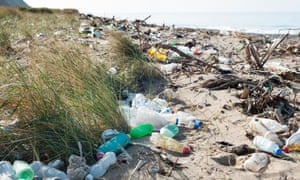
The chancellor, Philip Hammond, will announce in next week’s budget a “call for evidence” on how taxes or other charges on single-use plastics such as takeaway cartons and packaging could reduce the impact of discarded waste on marine and bird life, the Treasury has said.
The commitment was welcomed by environmental and wildlife groups, though they stressed that any eventual measures would need to be ambitious and coordinated.
An estimated 12m tonnes of plastic enters the oceans each year, and residues are routinely found in fish, sea birds and marine mammals. This week it emerged that plastics had been discovered even in creatures living seven miles beneath the sea.
The introduction just over two years ago of a 5p charge on single-use plastic bags led to an 85% reduction in their use inside six months.
Separately, the environment department is seeking evidence on how to reduce the dumping of takeaway drinks containers such as coffee cups through measures such as a deposit return scheme.
Announcing the move on plastics, the Treasury cited statistics saying more than a million birds and 100,000 sea mammals and turtles die each year from eating or getting tangled in plastic waste.
The BBC series Blue Planet II has highlighted the scale of plastic debris in the oceans. In the episode to be broadcast this Sunday, albatrosses try to feed plastic to their young, and a pilot whale carries her dead calf with her for days in mourning. Scientists working with the programme believed the mother’s milk was made poisonous by pollution.
The call for evidence will begin in the new year and will take into account the findings of the consultation on drinks containers.
Tisha Brown, an oceans campaigner for Greenpeace UK, said the decades-long use of almost indestructible materials to make single-use products “was bound to lead to problems, and we’re starting to discover how big those problems are”.
She said: “Ocean plastic pollution is a global emergency, it is everywhere from the Arctic Ocean at top of the world to the Marianas trench at the bottom of the Pacific. It’s in whales, turtles and 90% of sea birds, and it’s been found in our salt, our tap water and even our beer.
“The Treasury’s announcement is only a statement of intent, but it recognises the significance of the problem and the urgent need for a solution. There is a long way to go, but hopefully this is the beginning of the end for single-use plastic.”
Source: UK considers tax on single-use plastics to tackle ocean pollution | Environment | The Guardian


We have OXO opener, but it slips a lot. I can’t seem to grip the jar lid if it does not have a tread. So, it is quite effective for some lids (especially the plastic ones that are softer and permit a true grip), but it just does not grab a smooth metal top, especially one that is large.